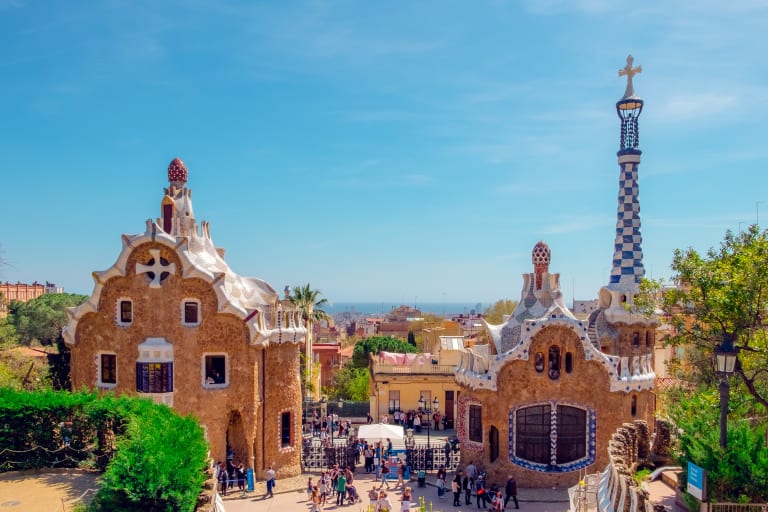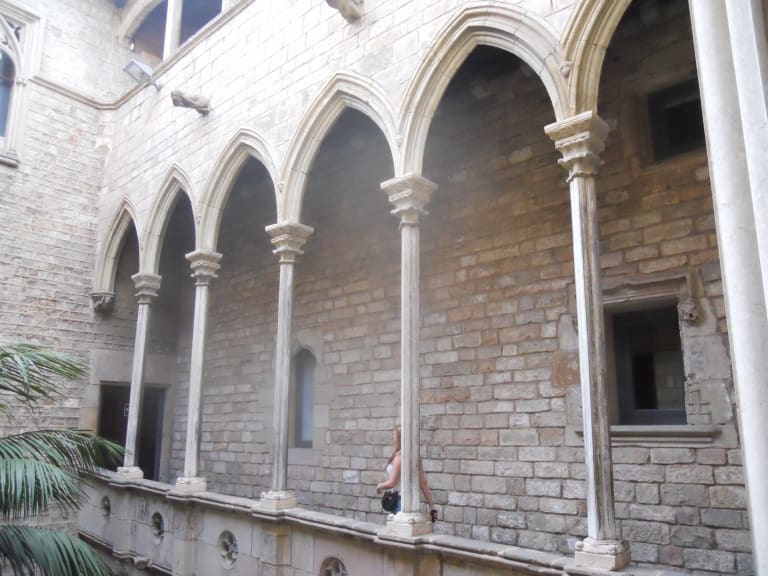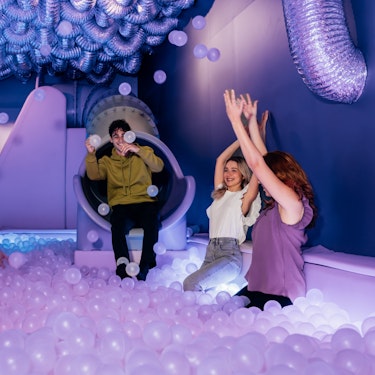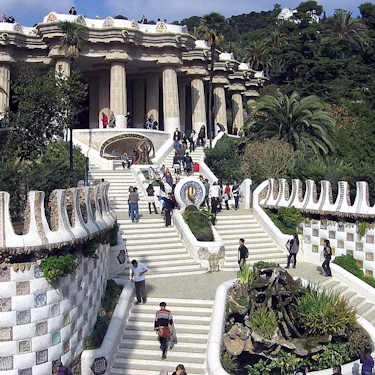More about: 4 Best Museums in Barcelona
Located on the shores of the Mediterranean Sea, Barcelona is a city that breathes art and culture. Its range of museums is one of the most varied and interesting in Europe, with spaces dedicated to both modern and classical currents.
A trip is the perfect opportunity to visit some of Barcelona's museums and soak up the city's history, culture and personality. I'll tell you which museums I think are essential!
The best museums in Barcelona

Before choosing one museum over another, I recommend that you find out what you can see in each of them. I'll tell you what I think are the best in the city:
- National Art Museum of Catalonia - from AED 51
- Picasso Museum of Barcelona - from AED 168
- Joan Miró Foundation of Barcelona - from AED 63
- Museum of the Spanish People in Barcelona - from AED 59
- Barcelona Museum of Contemporary Art (MACBA) - from AED 52
- Egyptian Museum of Barcelona - from AED 64
- Ba AED 88na Wax Museum - from 99€
National Art Museum of Catalonia

This is one of the best museums in Barcelona to visit, in fact it's considered one of the most important in Spain, so it's not to be missed on your list of places to visit. I would even say that it should be at the top of the list for two reasons:
Firstly for its impressive art collection, which spans from Romanesque to mid-20th century (almost a 1,000-year historical period!) and secondly for the spectacular building in which it is housed, the National Palace, built in 1929 for the Universal Exposition held in the city. It is beautiful.
How to visit it?
As the MNAC is one of the most popular museums in Barcelona, I recommend that you book your tickets to the National Art Museum of Catalonia online well in advance to ensure your place on the day of your chosen visit.
What will you see?
Mainly an overview of Catalan art from the Romanesque to the mid-20th century to explain its evolution and the different artistic currents, although special mention is also made of the Spanish and European Renaissance and Baroque, as well as modern Catalan art and a few other surprises.
Believe me when I tell you that it will be difficult to choose the room you like best! Personally, I think the examples of Romanesque and Gothic art you'll find in the National Art Museum of Catalonia are something from another planet, a marvel. Especially the frescoes of Sant Climent de Taüll, which will blow your mind!
Recommended if... you are enthusiastic about Romanesque and Gothic art or the work of world-renowned painters.
Useful information
- Where: Palau Nacional, Parc de Montjuïc, s/n, 08038 Barcelona
- How to get there: By bus on lines 55, 150, 13, 37, 27, 50, 65, 79, 109, 165, D20, H12 and V7. / By metro on lines 1 and 3, Plaza España station.
- How long does it take to see it? Around 3 hours.
Picasso Museum

The Picasso Museum is one of the most beloved museums in Barcelona by art lovers. Not only because it has a very complete repertoire of the Malaga painter's youth and formative years (nearly 4,000 works!) but also because he himself created this institution together with a friend, who donated most of the pieces in the collection.
So that's all the more reason to go! It can be said that this museum, in which he put a part of his soul, was a gift to Barcelona as it was a city very dear to him where he spent so many good times.
How to visit it?
You can get your tickets for the Picasso Museum in Barcelona at the ticket office. The general admission ticket costs 12 euros while the reduced ticket costs 7 euros.
However, admission is free on Thursday afternoons from 5 pm and on the first Sunday of every month, so if you have a free slot in your diary it can be a great option to visit.
What will you see?
Visiting the Picasso Museum is a good opportunity to discover perhaps one of the most unknown stages of the painter, that of his beginnings. However, it is also a good opportunity to take a closer look at the five Gothic palaces in which the museum is located. One of the best examples of medieval civil architecture in Catalonia.
Recommended if... you love Picasso and his work. I recommend that you combine your visit with a visit to the European Museum of Modern Art, as both are located very close together in the El Born neighbourhood.
Practical information
- Where: Carrer Montcada, 15-23.
- How to get there: By bus: lines 39, 51, 45, 120, V15, V17, H14. / By metro: line 1, Arc de Triomf station; line 3, Liceu station and line 4, Jaume I station.
- How long does it take to get there: about 2 hours and 45 minutes.
European Museum of Modern Art (MEAM)

I remember that this was one of the museums in Barcelona that surprised me the most because its theme, unlike other contemporary art galleries, is not dedicated to abstract art but to realist art. Its aim is to share the figurative art of living artists from the 20th and 21st centuries.
If you think that contemporary art doesn't suit you, I recommend you to visit the European Museum of Modern Art because you will surely change your opinion: it is much more interesting than most visitors think!
How to visit?
Plan your cultural day out in the streets of Barcelona and get your tickets to the European Museum of Modern Art online so you don't miss out on the date you want.
This ticket will give you access to both the permanent and temporary exhibitions so you'll be able to see the museum in detail, without missing anything.
What will you see?
If you like contemporary art, you'll see pieces in the collection that will blow your mind - they're so hyper-realistic you'll think you're looking at a photograph!
Many people don't know about the MEAM and pass by the nearby Picasso Museum, but now that you know about it, don't hesitate to visit it because they also have an interesting programme of concerts, plays and workshops for children that will make your day different.
The same thing happens with the MEAM as with the National Art Museum of Catalonia: the visit is worthwhile both for the content and for the continent. This museum is located in the Palau Gomis, a unique neoclassical building in Barcelona.
Recommended if... you like realistic art or are looking for a different museum that is not overcrowded for a cultural day out. When you finish, you can go out for tapas in the El Born neighbourhood.
Practical information
- Where: Barra de Ferro, 5.
- How to get there: By bus on lines 14, 40, 42, 45, 59, 64, 120, H14, H16, V15 and V17. / Metro line 1, Arc de Triomf station and line 4, Jaume I station.
- How long does it take to get there: Approximately 1 hour and 30 minutes.
Museum of the History of Catalonia and the terrace

Another of Barcelona's most interesting museums to visit on a city break is the Museum of the History of Catalonia.
If you're a history buff, you'll really enjoy its exhibitions because you'll discover the history of the Catalan community from the Palaeolithic period to the end of the 20th century in a fun and interactive way (a relief for children if you visit it with them).
Imagine trying on medieval armour, grinding wheat in the style of the Iberian people or getting on a tram... You won't just be looking at display cases!
How to visit it?
This is one of the museums in Barcelona where queues typically form at the entrance, not only because of its collection but also because on its terrace there is a panoramic viewpoint with wonderful views of the city's port.
My advice is to buy online this ticket to the Museum of the History of Catalonia, which will give you queue-free access to the museum to see the permanent and temporary exhibitions as well as its terrace.
What will you see?
On the outside, you'll see the Palau del Mar, the only 19th-century building still standing from the old port of Barcelona. Inside, you'll take a trip back in time through the history of Catalonia to learn all about this community in a visual and interactive way.
What's more, from its terrace you can enjoy one of the most beautiful views of the port of Barcelona and even have some tapas in its "1881" restaurant. They have delicious cocktails! It's a good plan to do after visiting the museum, don't you think?
Recommended if... you like history and want to learn more about the history of Catalonia to contextualise your trip, or if you fancy enjoying spectacular views of the port of Barcelona.
Practical information
- Where: Plaza de Pau Vila, 3.
- How to get there: By bus on lines 14, 17, 19, 36, 39, 40, 40, 45, 45, 51, 57, 59, 64 and 157. / By metro on line 4, Barceloneta station.
- How long does it take to see it: Approximately 2 hours.
Barcelona Museums Pass (Articket)

If you are an art lover and one of the reasons you travel to Barcelona is to visit its museums and soak up culture, I recommend you buy the Articket, the Barcelona Museums Pass.
With this pass you will not only save money but also time, as you will be able to enter directly into several of Barcelona's most important museums without queuing up.
You'll also have access to the permanent and temporary exhibitions at the Picasso Museum, the National Art Museum of Catalonia, the Joan Miró Foundation, the Centre of Contemporary Culture of Barcelona (CCCB), the Antoni Tàpies Foundation and the Museum of Contemporary Art of Barcelona (MACBA).
Most museums in Barcelona have free admission for children between 0 and 15 years old, so if you're travelling with your family, we recommend that you check before buying the Articket.
About tickets

When you buy your ticket or book your tour, you will receive a confirmation email. With the exception of the museum pass (which you will need to exchange), you will be able to show your ticket at the museum to access the exhibition of your choice. In the case of the museum pass, it is also valid for one year from the time you redeem your voucher for the pass.
Organise your visit to Barcelona's museums

Opening days and times
- Most museums in Barcelona open between 9:00 and 10:00 and close between 18:30 and 20:00, depending on the season.
- Most museums in Barcelona close on Mondays, so be sure to visit them on any other day of the week (and if possible, avoid weekends, as this is when they receive the most visitors).
- All museums are closed on 25 December and 1 and 6 January for religious holidays.
Tips for your visit

- If you can't decide on just one museum, my opinion is that the Picasso Museum is the most worthwhile for its large collection and the chance to explore the artist's work in depth.
- If you decide on the National Art Museum of Catalonia, bear in mind that it is located at the top of Montjuïc, the city's mountain, from where you can see some very beautiful sunsets. It might be a good idea to go up in the afternoon, explore the museum and the area, and end the day watching the sunset.
- Allow between 45 minutes and 1 hour 30 minutes to visit the museum of your choice, as long as you don't want to make an exhaustive visit that will take you a whole morning or part of the afternoon.
- Besides the museums mentioned here, which in my opinion are the most outstanding in Barcelona, the city has many others that might interest you because of the specificity of their exhibitions. Some examples of other museums in Barcelona are the Maritime Museum, the Erotic Museum, the Design Museum, the Chocolate Museum, CosmoCaixa or the Olympic Sports Museum, to name a few.
Other visits that may interest you

On your trip to Barcelona, most of your visits will be related in one way or another to **Gaudí'**s architecture. Of course, the Sagrada Familia is an absolutely essential visit, so I have written a guide about Barcelona Sagrada Familia Tickets and Visits which will surely be very useful when it comes to getting your tickets.
I also recommend you to read my guide on Park Güell in Barcelona Tickets and Tours to find out all the tips and tricks to visit it. And while you're at it, take a look at my guide to La Pedrera in Barcelona Tickets and Tours and Barcelona Casa Batlló Tickets and Visitswith the best tips for exploring these two architectural gems of the city.
For football fans, visiting the Camp Nou is an experience that can be very interesting as in the Camp Nou Experience you can explore the trophy gallery, a space dedicated to Messi, a very interesting audiovisual area and of course the stands, the changing rooms and the press room. Find out how to visit here: Barcelona Spotify Camp Nou Stadium Visits.
























